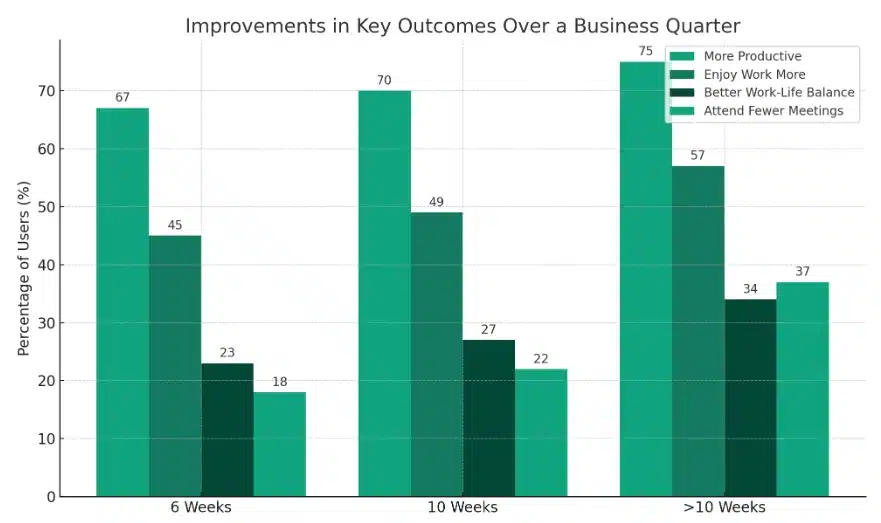In the rapidly evolving world of work, artificial intelligence (AI) has emerged as a pivotal force for enhancing productivity and job satisfaction. A recent study conducted by Microsoft on using Copilot for Microsoft 365 sheds light on an intriguing phenomenon known as the “11-by-11 tipping point.”
This concept has sparked considerable interest among business leaders eager to foster AI adoption within their organizations. The findings offer valuable insights into how relatively modest time savings can significantly impact users’ perceptions of AI’s utility and encourage the formation of lasting 11-minute secret to AI habits.
The Study
Microsoft’s research involved a survey of 1,300 Copilot for Microsoft 365 users from various functions and industries, focusing on AI’s impact on their productivity, work enjoyment, and other aspects. The study aimed to identify factors influencing these outcomes and understand the optimal conditions for integrating AI into daily workflows.
Discovering the Magic Number
Remarkably, the study found that a time saving of just 11 minutes per day was the critical threshold at which users began to perceive AI as valuable. While the most efficient users reported saving up to 30 minutes daily.
Even a modest average of 14 minutes per day, or nearly five hours each month, was sufficient to enhance users’ views on AI’s usefulness. This 11-minute mark proved crucial for users to feel incentivized to incorporate AI into their routines more consistently.
The 11-Week Breakthrough
Further insights revealed that after 11 weeks of regular use, Copilot users reported significant improvements in four key areas: productivity, work enjoyment, work-life balance, and reduced need for meetings.
This duration—equivalent to about one business quarter—marks a critical period for users to experience tangible benefits from AI, culminating in a stronger, more positive relationship with the technology.
Making Work Better
Across roughly three months (11 weeks), users of Copilot experienced enhancements in four major areas work efficiency, reduction in meetings, greater enjoyment of work, and improved balance between work and personal life.

As illustrated in the chart above, the progression over 6 weeks, 10 weeks, and more than 10 weeks demonstrates significant user-reported improvements across all measured areas.
- Productivity: The percentage of users reporting increased productivity rose from 67% at 6 weeks to 75% at more than 10 weeks, underscoring the tool’s impact on enhancing work efficiency.
- Work Enjoyment: The data shows a noticeable improvement in work enjoyment, climbing from 45% of users at 6 weeks to 57% at more than 10 weeks, highlighting how Copilot contributes to a more satisfying work experience.
- Work-Life Balance: Users feeling an improvement in work-life balance grew from 23% at 6 weeks to 34% at more than 10 weeks, reflecting the positive effect of Copilot on managing work and personal life.
- Fewer Meetings: Perhaps most striking is the increase in users able to attend fewer meetings, which nearly doubled from 18% at 6 weeks to 37% at more than 10 weeks, demonstrating Copilot’s efficiency in reducing unnecessary meetings.
These findings reinforce the transformative potential of AI in the workplace, particularly when users reach the “11-by-11 tipping point.” It’s not just about saving time; it’s about enhancing the quality of work and life for employees.
By narrowing in on specific use cases that save time from the start, individuals can more quickly realize these benefits, reinforcing the habit of integrating AI into their daily work routine.
Why It Matters
The “11-by-11 tipping point” serves as a powerful model for businesses aiming to unlock the full potential of AI within their organizations. By achieving just 11 minutes of daily time savings over 11 weeks, most company employees can develop a productive AI habit, propelling the organization towards greater efficiency and innovation.
Fostering AI Adoption
To reach this tipping point, companies should focus on identifying immediate, tangible use cases that save time from day one. For example, leveraging AI to summarize meetings or documents can easily save the requisite 11 minutes. Encouraging continued use and patience during the initial 11-week period is crucial, as it allows users to adjust to this new way of working and recognize the long-term benefits.
Over 11 weeks, the daily time savings accumulate to 10 hours—effectively granting each employee an additional work week each year. This represents a significant gain in productivity and work-life balance, highlighting the importance of integrating AI into workplace practices.
Methodology and Future Directions
The ongoing Copilot Usage in the Workplace survey, initiated in September 2023, collects data from Microsoft employees and early Copilot users primarily in North America and Europe. Participants had been using Copilot for a minimum of three weeks, ensuring a baseline familiarity with the tool.
As businesses continue to navigate the challenges and opportunities presented by digital transformation, the insights from Microsoft’s study offer a promising roadmap for harnessing AI to enhance productivity and job satisfaction across industries.
The “11-by-11 tipping point” exemplifies the potential for even small increments of time savings to foster meaningful engagement with AI technologies, setting the stage for a future where AI is an integral part of everyday work life.



